Majority of Republicans say Democrats are ‘more unpatriotic’ than other Americans
Three years ago, Pew Research Center found that the 2016 presidential campaign was “unfolding against a backdrop of intense partisan division and animosity.” Today, the level of division and animosity – including negative sentiments among partisans toward the members of the opposing party – has only deepened.
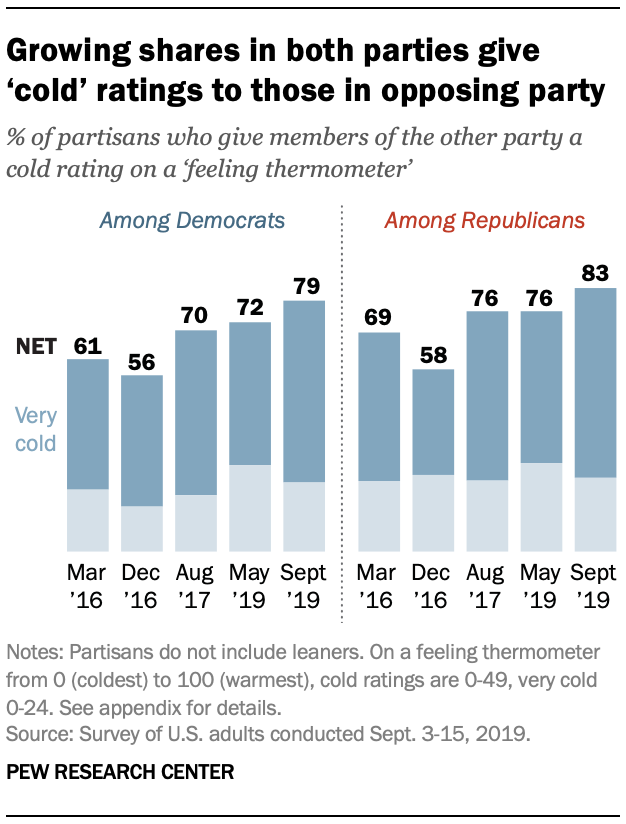 The
share of Republicans who give Democrats a “cold” rating on a 0-100
thermometer has risen 14 percentage points since 2016 – with virtually
all of the increase coming in “very cold” ratings (0-24). Democrats’
views of Republicans have followed a similar trajectory: 57% give
Republicans a very cold rating, up from 41% three years ago.
The
share of Republicans who give Democrats a “cold” rating on a 0-100
thermometer has risen 14 percentage points since 2016 – with virtually
all of the increase coming in “very cold” ratings (0-24). Democrats’
views of Republicans have followed a similar trajectory: 57% give
Republicans a very cold rating, up from 41% three years ago. The survey by Pew Research Center was conducted Sept. 3-15 among 9,895 adults (it was completed before House Speaker Nancy Pelosi’s Sept. 24 announcement of an impeachment inquiry into President Donald Trump). It finds that both Republicans and Democrats express negative views about several traits and characteristics of those in the opposing party, and in some cases these opinions have grown more negative since 2016.
For example, 55% of Republicans say Democrats are “more immoral” when compared with other Americans; 47% of Democrats say the same about Republicans. Three years ago, 47% of Republicans and 35% of Democrats said members of the other party were less moral than other people.
For the most part, Republicans are more likely than Democrats to ascribe negative characteristics to people in the opposing party, with one exception: 75% of Democrats say Republicans are “more closed-minded” than other Americans, while 64% of Republicans say the same about Democrats.
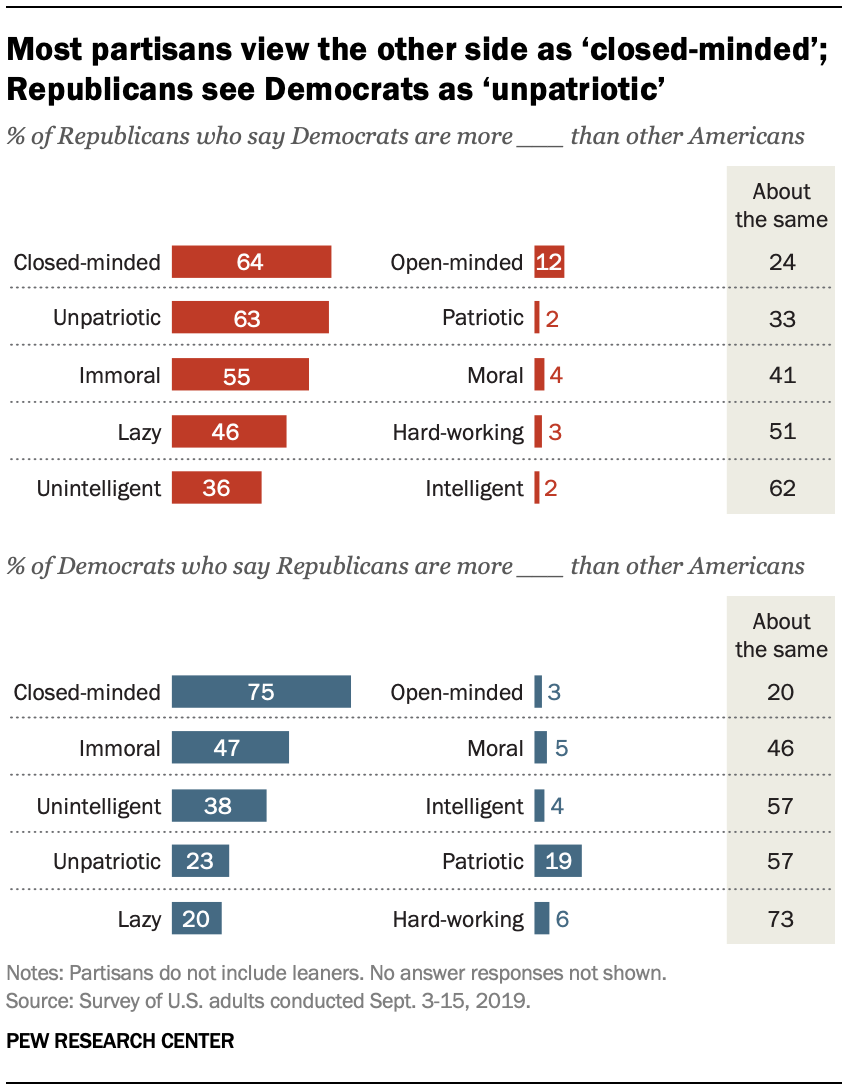 Yet
Republicans are far more likely than Democrats to view members of the
opposing party as unpatriotic. A 63% majority of Republicans say that,
compared with other Americans, Democrats are “more unpatriotic.” Just
23% of Democrats say the same about Republicans.
Yet
Republicans are far more likely than Democrats to view members of the
opposing party as unpatriotic. A 63% majority of Republicans say that,
compared with other Americans, Democrats are “more unpatriotic.” Just
23% of Democrats say the same about Republicans. The survey also finds that partisan hostility extends beyond politics. Fewer than half of Democrats (45%) and just 38% of Republicans say that while members of the other party feel differently about politics, they share many of their other values and goals. Majorities in both parties say those in the opposing party do not share their nonpolitical values and goals.
As prior surveys on partisan polarization have shown, partisans who are highly attentive to politics are most likely to express negative sentiments about the opposing party. For example, both Republicans and Democrats who follow government and public affairs most of the time are more likely to give cold ratings to members of the other party – and warm ratings to their fellow partisans – than those who follow government less closely.
Even as Republicans and Democrats have grown more critical of each other, they acknowledge – and voice concern about – the partisanship dividing the nation. Overwhelming majorities in both parties (85% of Republicans and 78% of Democrats) say divisions between the two parties are increasing. Similar shares express concern about the partisan divide, with about half in each party saying they are very concerned about this.
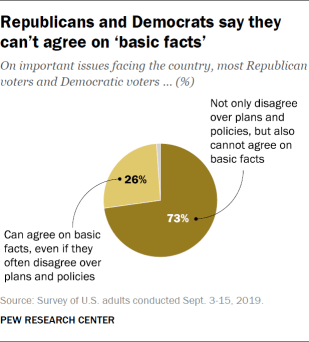
Partisans also generally agree about their inability to agree on “basic facts.” Overall, 73% of the public – including 77% of Republicans and 72% of Democrats – say that voters in both parties “not only disagree over plans and policies, but also cannot agree on the basic facts.”
These are among the other important findings from the survey on how partisans view each other and the political parties:
Majorities of Americans describe both parties as ‘too extreme.’ More Americans say the Democratic Party than Republican Party is described well by such phrases as “is respectful and tolerant of different types of people,” “cares about the middle class” and “governs in an honest and ethical way.” But nearly identical majorities say each party is described at least somewhat well by the phrase “is too extreme in its positions” (63% say this about the Republican Party, 61% about the Democratic Party).
Partisan ‘leaners’ also are hostile to the opposing party. Independents who lean toward the Republican and Democratic parties are much less likely than those who identify with a party to express warm feelings about the people in their own parties. But large majorities of Republican and Democratic leaners give cold ratings to the people in the opposing party, and there are only modest differences between leaners and partisan identifiers in these views.
Majority of Democrats want a presidential candidate who seeks ‘common ground’ with GOP. Nearly six-in-ten Democrats (58%) say it is more important for a Democratic presidential candidate, if elected, to find common ground with Republicans on policies even if that means giving up some things Democrats really want, while 41% say it’s more important to push hard for Democratic policies even if it’s harder to get things done. By contrast, about half of Republicans (53%), say Donald Trump should push hard for GOP policies even if that means less gets done; 45% say he should make compromises with Democrats even if that means giving up things Republicans really want.
The partisan landscape and views of the parties
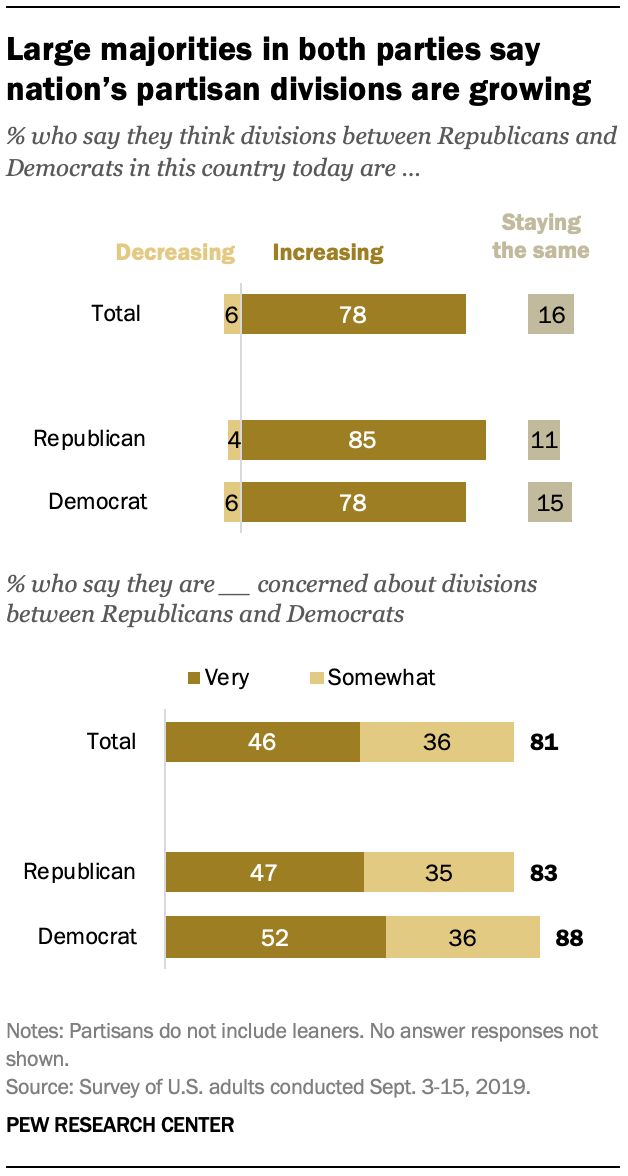 Republicans
and Democrats agree on very little in the current political
environment, but there is a widespread belief in both parties that
partisan divisions in the country are increasing. Among the public
overall, 78% say divisions between Republicans and Democrats in this
country are increasing, while just 6% say they are decreasing and 16%
say they are staying the same.
Republicans
and Democrats agree on very little in the current political
environment, but there is a widespread belief in both parties that
partisan divisions in the country are increasing. Among the public
overall, 78% say divisions between Republicans and Democrats in this
country are increasing, while just 6% say they are decreasing and 16%
say they are staying the same. Large majorities in both parties say partisan divisions are increasing, though Republicans are somewhat more likely than Democrats to express this view (85% vs. 78%).
Similarly, large majorities in both parties express concern about rising partisanship. About eight-in-ten adults (81%) say they are very or somewhat concerned about divisions between Republicans and Democrats, including nearly half (46%) who say they are very concerned about the growing divide.
Comparable shares of Republicans and Democrats express concern about divisions between the two parties, though Democrats are slightly more likely to say this than Republicans (88% vs. 83%).
A similar pattern is evident among independents who lean toward a party. About three-quarters of independents who lean toward the Republican Party (77%) or Democratic Party (74%) say partisan divisions are growing. Comparable shares of those who lean toward each party express concern about this.
Growing share of Americans say there are major differences in what the parties stand for
A majority of Americans (55%) say there is a “great deal” of difference in what the Republican and Democratic parties stand for, while 37% see a “fair amount” of difference and 7% say there is “hardly any” difference between the two parties.
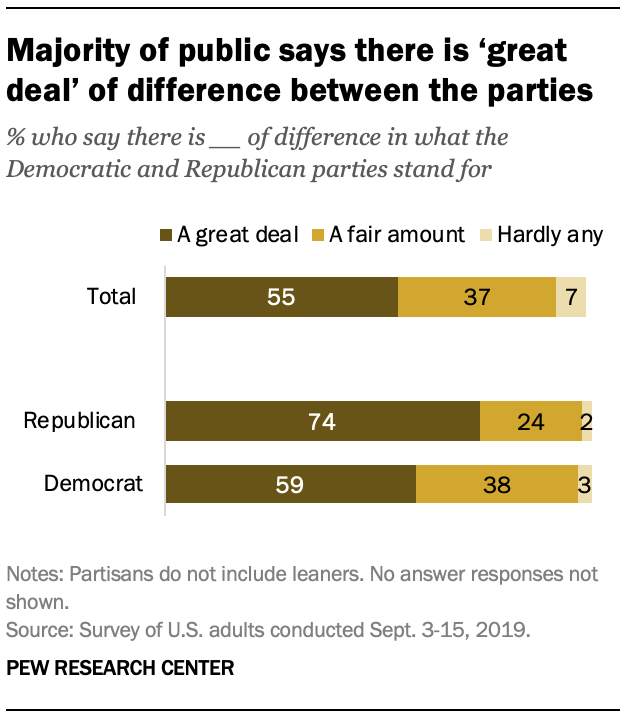 These
opinions have changed dramatically over the past three decades. From
the late 1980s through the mid-2000s, no more than about a third of
Americans said there were major differences between the two parties. But
the share expressing this view has increased, especially over the past
decade.1
These
opinions have changed dramatically over the past three decades. From
the late 1980s through the mid-2000s, no more than about a third of
Americans said there were major differences between the two parties. But
the share expressing this view has increased, especially over the past
decade.1 In the current survey, Republicans are more likely than Democrats to say there are major differences in what the parties stand for (74% of Republicans vs. 59% of Democrats).
In both parties, people who are attentive to politics on a regular basis are more likely than those who are less attentive to see wide, growing divides in the country.
Most Republicans who say they follow what is happening in government and public affairs most of the time perceive a great deal of difference in what the Democratic and Republican parties stand for (85%). Among Republicans who follow government and public affairs less often, a smaller majority (65%) says there are major differences between the parties. Among Democrats, there is a similar gap in views by engagement; 70% of politically attentive Democrats see a wide gulf between the parties, while just 49% of less-attentive Democrats say the same.
Most Americans say partisan disagreements extend beyond policies to ‘basic facts’
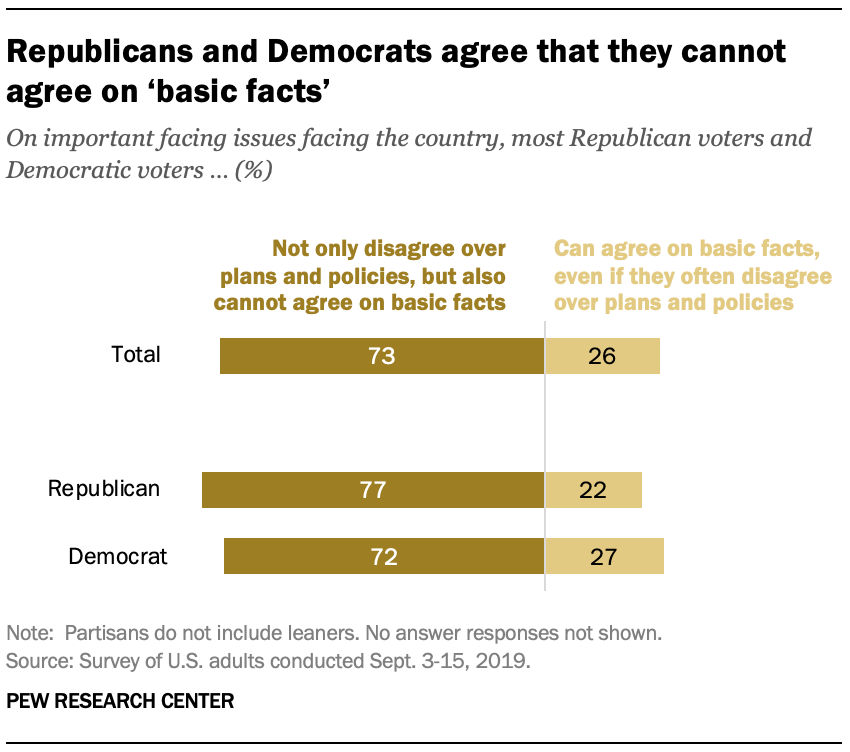 Fully
73% of the public says that most Republican and Democratic voters not
only disagree over plans and policies, but also disagree on “basic
facts.” Just 26% say that while partisan voters often differ over plans
and policies, they can agree on basic facts. These opinions have changed
only modestly since last year.
Fully
73% of the public says that most Republican and Democratic voters not
only disagree over plans and policies, but also disagree on “basic
facts.” Just 26% say that while partisan voters often differ over plans
and policies, they can agree on basic facts. These opinions have changed
only modestly since last year. Comparable majorities of Republicans (77%) and Democrats (72%) say that Republican and Democratic voters cannot agree on basic facts.
Does the other party have any good ideas?
Most Republicans and Democrats believe that few – or no – good ideas come from the other party. Only 17% of Republicans say that the Democratic Party has “a lot” or “some” good ideas” and only 13% of Democrats say this about the Republican Party. In fact, nearly half in both parties say the other has almost no good ideas.
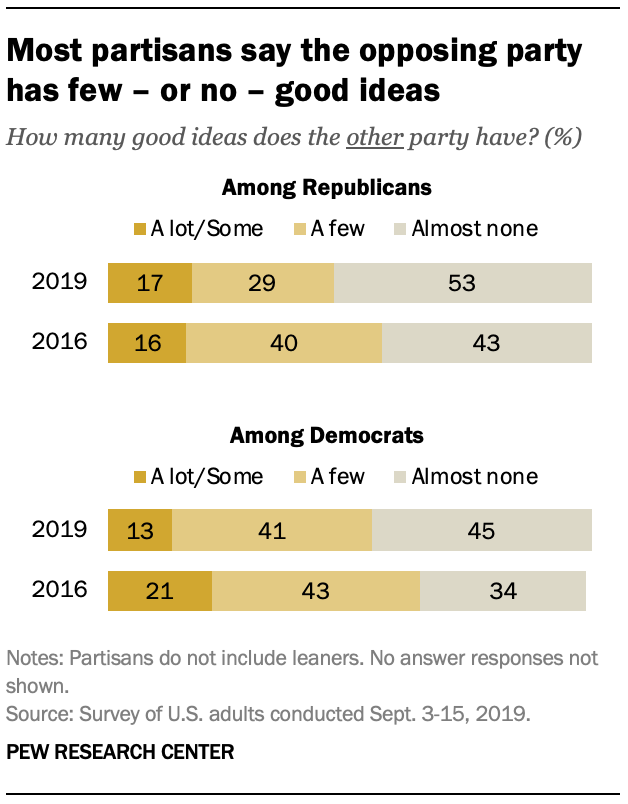 Overall,
45% of Democrats say the GOP has almost no good ideas, while 41% say it
has a few and just 13% say it has a lot or some good ideas. The share
of Democrats saying the Republican Party has almost no good ideas is
higher than it was in the spring of 2016 (45% now, 34% then), while the
share saying the GOP has at least some good ideas has dropped from 21%
to 13%.
Overall,
45% of Democrats say the GOP has almost no good ideas, while 41% say it
has a few and just 13% say it has a lot or some good ideas. The share
of Democrats saying the Republican Party has almost no good ideas is
higher than it was in the spring of 2016 (45% now, 34% then), while the
share saying the GOP has at least some good ideas has dropped from 21%
to 13%. Among Republicans, 53% say the Democratic Party has almost no good ideas, while another 29% say they have a few; just 17% of Republicans say the Democratic Party has a lot or some good ideas. The share of Republicans who say the Democratic Party has almost no good ideas has increased since 2016 (from 43% to 53%).
Republicans and Democrats have different views about compromising with the other party
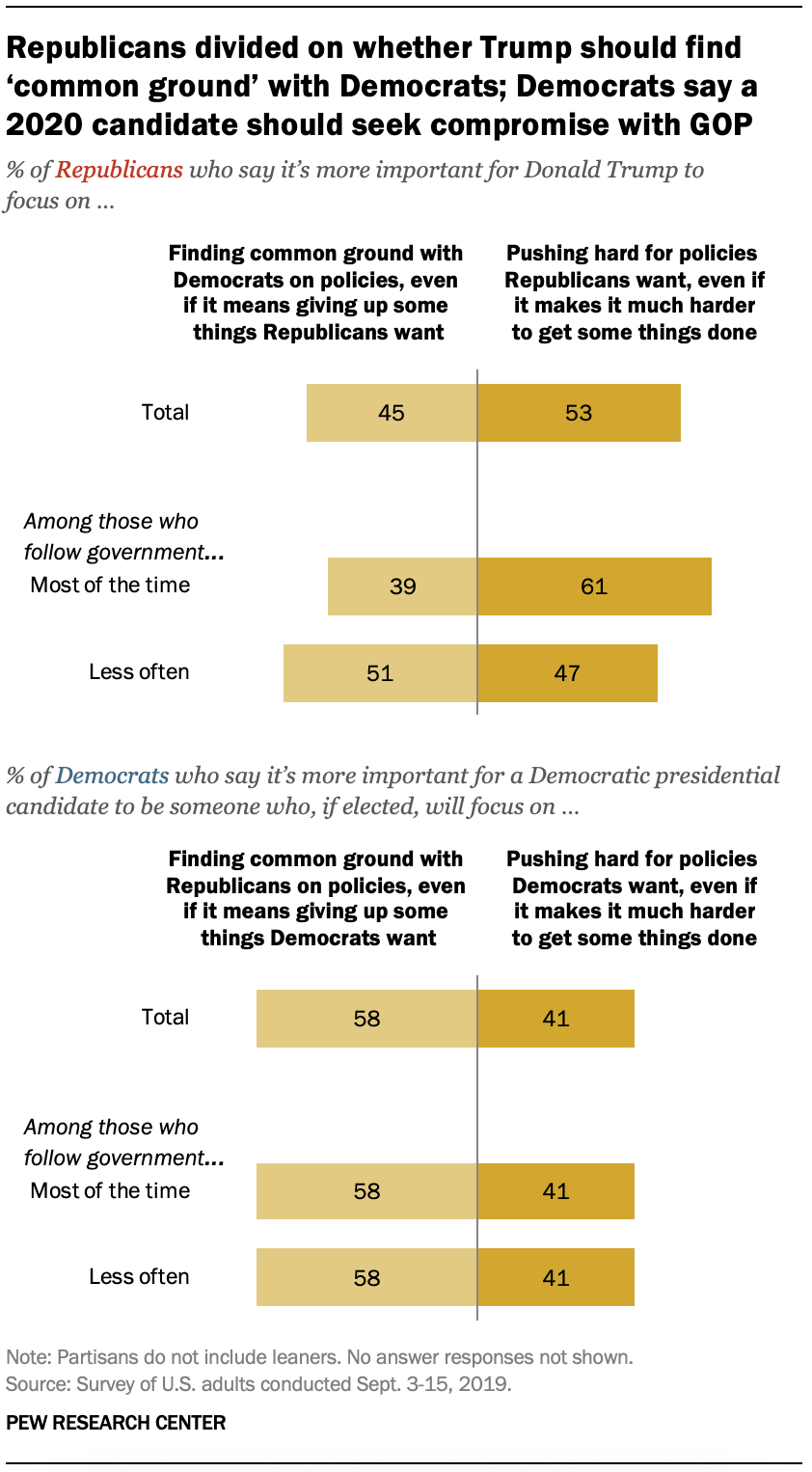 Overall,
Republicans are divided over whether Donald Trump should focus on
finding common ground with Democrats, even if that means giving up some
things Republicans want, or pushing hard for GOP policies, even if it
means less gets done. While 53% of Republicans say Trump should “push
hard” for the party’s policies, 45% say it’s more important for the
president to find common ground with Democrats.
Overall,
Republicans are divided over whether Donald Trump should focus on
finding common ground with Democrats, even if that means giving up some
things Republicans want, or pushing hard for GOP policies, even if it
means less gets done. While 53% of Republicans say Trump should “push
hard” for the party’s policies, 45% say it’s more important for the
president to find common ground with Democrats. However, politically attentive Republicans broadly oppose Trump seeking compromise with Democrats even if it means giving up some things Republicans want. Just 39% of Republicans who follow government and public affairs most of the time say it is more important for Trump to find common ground with Democrats; 61% say he should push hard for GOP policies. Opinion is more evenly divided among less politically attentive Republicans.
Democrats, who were asked a hypothetical version of the question about the party’s 2020 presidential candidates, are more open to potential compromise with Republicans. About six-in-ten Democrats (58%) say it is more important for a candidate, if elected, to find common ground with Republicans even if it means giving up things Democrats want.
There are no differences in these views among Democrats based on political attentiveness. But liberal Democrats (54%) are less likely than conservative and moderate Democrats (62%) to say it is more important for a candidate to seek compromises with Republicans.
There is an even sharper ideological divide among Republicans in views of whether Trump should make compromises. Just 39% of conservative Republicans say Trump should find common ground with Democrats if it means giving up things Republicans want; about two-thirds of GOP moderates and liberals (63%) say the same.
Views of the parties’ traits and characteristics
The Republican Party and the Democratic Party are both seen as too extreme by a majority of Americans. About six-in-ten (63%) say the phrase “too extreme in its positions” describes the Republican Party at least somewhat well, including 30% who say this describes the GOP very well. The share of Americans who say the same phrase applies to the Democratic Party is nearly identical: 61% say this applies at least somewhat, and 29% say it describes the party very well.
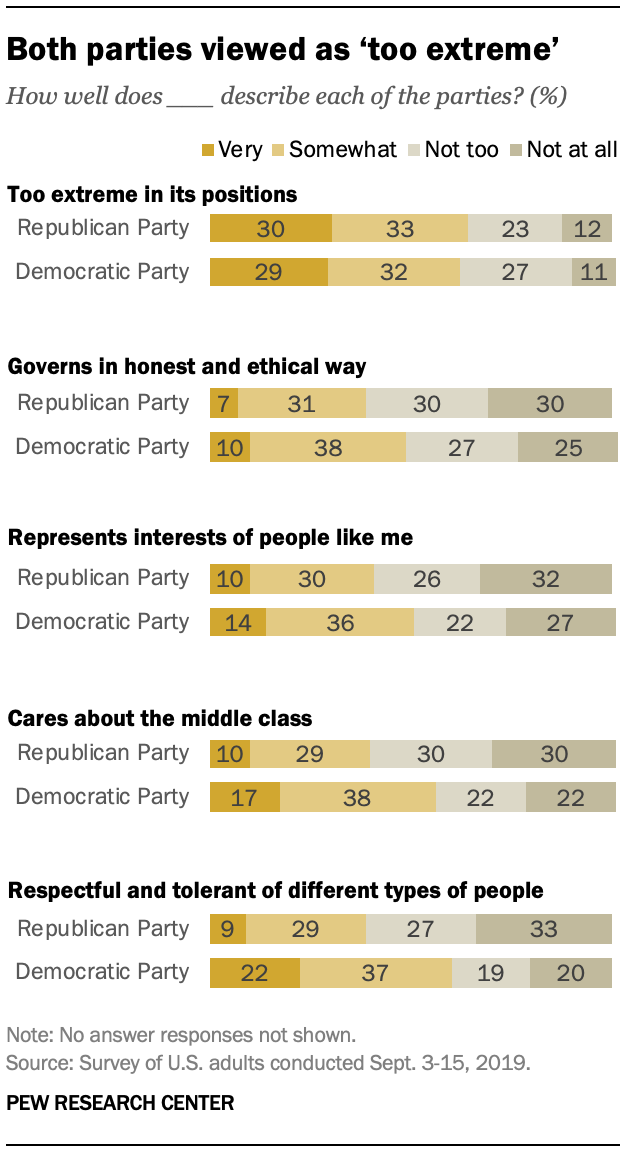 The
public also is critical of the parties ability to govern honestly and
ethically: Just 38% say the phrase “governs in an honest and ethical
way” describes the Republican Party at least somewhat well, while 61%
say it does not. Roughly half (47%) say this describes the Democratic
Party at least somewhat well, while about as many (52%) say it doesn’t.
The
public also is critical of the parties ability to govern honestly and
ethically: Just 38% say the phrase “governs in an honest and ethical
way” describes the Republican Party at least somewhat well, while 61%
say it does not. Roughly half (47%) say this describes the Democratic
Party at least somewhat well, while about as many (52%) say it doesn’t. The public views the Democratic Party more positively than the Republican Party on three other traits and characteristics. Four-in-ten (40%) say that the phrase “represents the interests of people like me” applies at least somewhat well to the Republican Party, while half (50%) say this phrase describes the Democratic Party at least somewhat well.
A majority (55%) says the description “cares about the middle class” describes the Democratic Party at least somewhat well. By comparison, 39% say that it applies to the Republican Party.
The widest gap in opinion across the items included in the survey is over whether the two parties are “respectful and tolerant of different types of people.” Six-in-ten (60%) say this phrase describes the Democratic Party at least somewhat well; 38% say it describes the Republican Party somewhat or very well.
Large majorities of Republicans and Democrats assign positive characteristics to their own party, while taking a much more negative view of the opposing party.
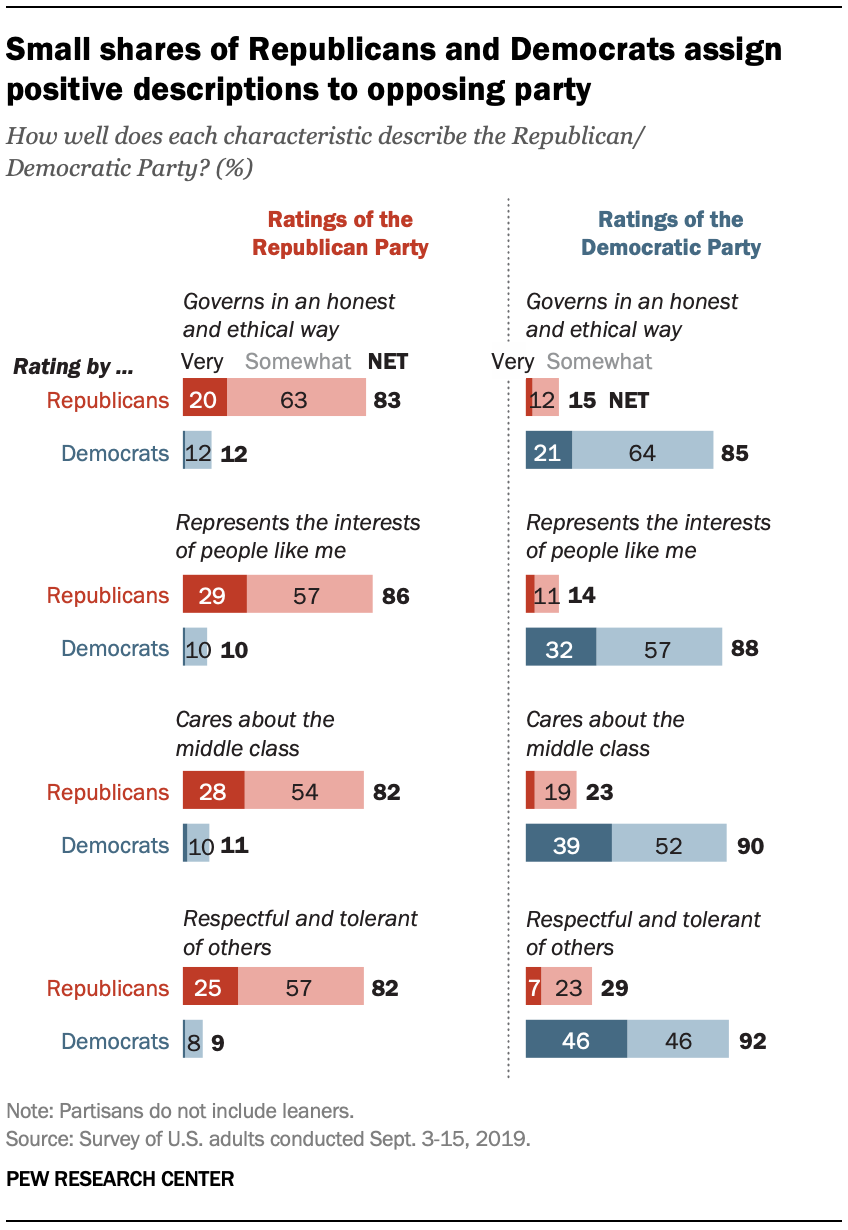 For
instance, 83% of Republicans say the phrase “governs in an honest and
ethical way” describes the GOP very or somewhat well; just 12% say this
phrase describes the Democratic Party well. The pattern of opinion is
very similar among Democrats: 85% of Democrats describe their own party
as governing in an honest and ethical way, while just 15% say this
describes the Republican Party.
For
instance, 83% of Republicans say the phrase “governs in an honest and
ethical way” describes the GOP very or somewhat well; just 12% say this
phrase describes the Democratic Party well. The pattern of opinion is
very similar among Democrats: 85% of Democrats describe their own party
as governing in an honest and ethical way, while just 15% say this
describes the Republican Party. However, a greater share of Democrats (90%) than Republicans (82%) say their own party cares about the middle class. In addition, the share of Republicans who say the Democratic Party cares about the middle class (23%) is larger than the share of Democrats who describe the GOP this way (11%).
There is a similar pattern on views of how respectful and tolerant the parties are of different types of people. A larger majority of Democrats (92%) than Republicans (82%) describe their own party this way. And out-party assessments – while low among both sets of partisans – are more positive among Republicans than Democrats.
Republicans and Democrats are more willing to critique their own party over the extremity of its positions. Overall, 47% of Democrats and 45% of Republicans say their own party is described very or somewhat well by the phrase “too extreme in its positions.”
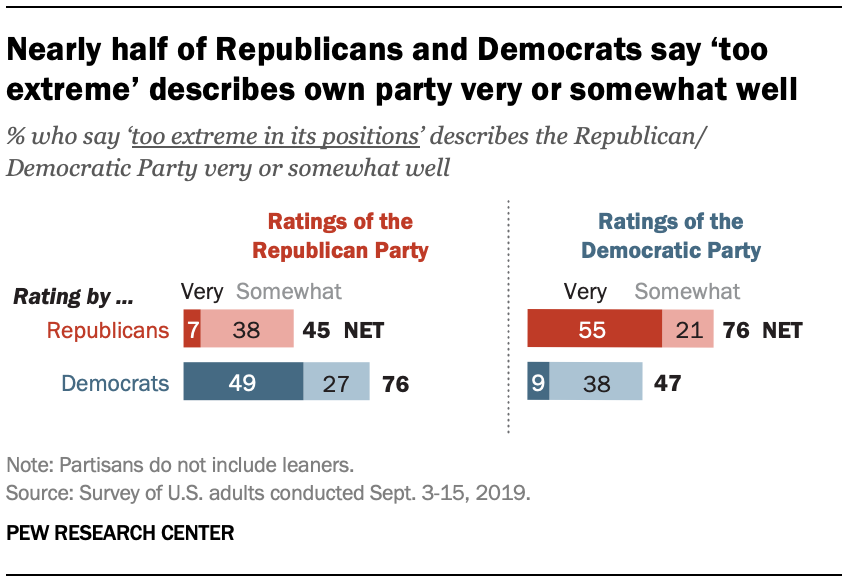 Still,
partisans are much more likely to cast this criticism toward the
opposing party than their own: Majorities of Republicans and Democrats
(both 76%) describe the opposing party as too extreme in its positions.
Still,
partisans are much more likely to cast this criticism toward the
opposing party than their own: Majorities of Republicans and Democrats
(both 76%) describe the opposing party as too extreme in its positions. On this measure, there is little difference between partisan leaners and identifiers. Similar majorities of those who identify with a party and those who lean toward a party view the other side as too extreme in its positions.
Across the positive traits included in the survey – such as governing in an honest and ethical way – smaller majorities of partisan leaners than identifiers take a positive view of the party they associate with.
How partisans view each other
Large shares of Republicans and Democrats associate several negative traits with members of the other party. Wide majorities in both parties – three-quarters of Democrats (75%) and 64% of Republicans – say those in the other party are more closed-minded than other Americans. And 55% of Republicans and 47% of Democrats view members of the other party as more immoral than other Americans. In both parties, the share saying those in the other political camp are closed-minded or immoral has increased since these questions were last asked in 2016.
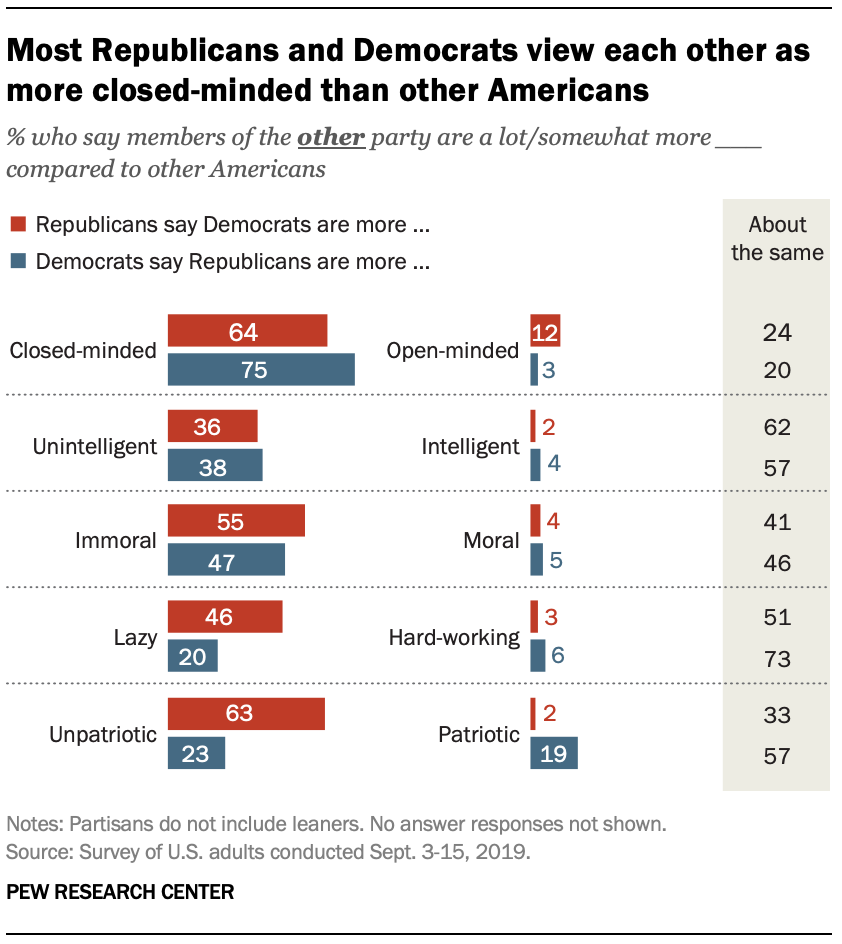 Republicans
are substantially more likely to characterize Democrats as more
unpatriotic than other Americans than Democrats are to say this of
Republicans: 63% of Republicans view Democrats as more unpatriotic. By
comparison, just 23% of Democrats say this about Republicans, while a
majority (57%) say Republicans are about as patriotic as other
Americans. In fact, Democrats are roughly as likely to say Republicans
are more patriotic than other Americans as they are to say they are less
patriotic (19% vs. 23%).
Republicans
are substantially more likely to characterize Democrats as more
unpatriotic than other Americans than Democrats are to say this of
Republicans: 63% of Republicans view Democrats as more unpatriotic. By
comparison, just 23% of Democrats say this about Republicans, while a
majority (57%) say Republicans are about as patriotic as other
Americans. In fact, Democrats are roughly as likely to say Republicans
are more patriotic than other Americans as they are to say they are less
patriotic (19% vs. 23%). Republicans also are more likely to describe Democrats as lazy than Democrats are to characterize Republicans in this way. Still, this is a minority opinion in both parties (46% of Republicans and 20% of Democrats view those in the other party as more lazy than other Americans).
Most Democrats and Republicans do not think of those in the other party as different from their fellow Americans when it comes to intelligence (roughly six-in-ten say they are about the same as other Americans). However, 36% of Republicans and a similar share of Democrats (38%) do say those in the other party are more unintelligent than other Americans.
Overall, roughly eight-in-ten Republicans (82%) and Democrats (78%) say at least one of these negative descriptors applies to those in the other party. But Republicans are substantially more likely than Democrats to ascribe multiple negative characteristics to Democrats. Seven-in-ten Republicans ascribe two or more of the five negative characteristics to Democrats, while 58% of Democrats associate two or more of these characteristics with Republicans. And 20% of Republicans associate all five negative characteristics with Democrats, while 8% of Democrats say all five negative descriptors apply to Republicans.
More now associate some negative traits with the ‘other side’ than in 2016
The shares of both Republicans and Democrats ascribing several of these negative traits to members of the other party have increased significantly since the spring of 2016.
The share of Republicans who say Democrats are more closed-minded has increased substantially over this time period. In 2016, about half of Republicans (52%) said Democrats were more closed-minded than other Americans. Now, a clear majority (64% of Republicans) say this – an increase of 12 percentage points. While the shift is more modest among Democrats, it is in the same direction (from 70% to 75% saying Republicans are more closed-minded than other Americans).
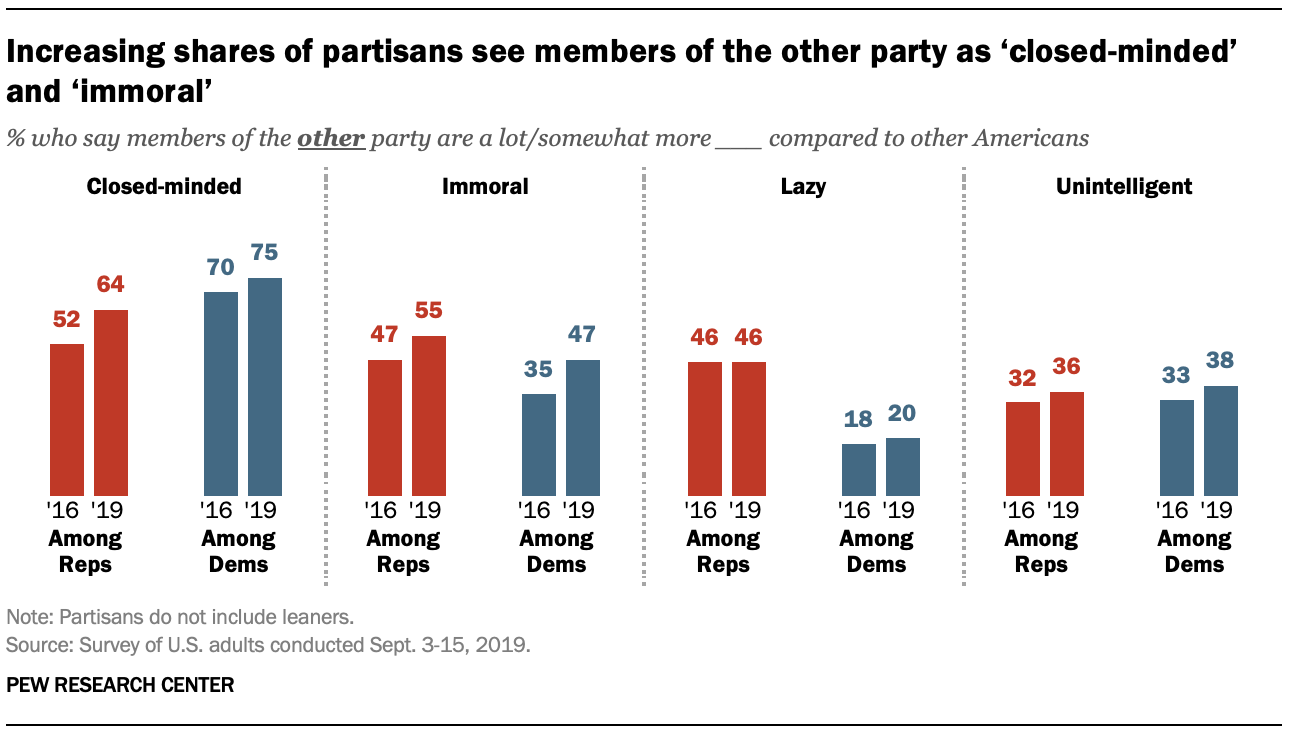
Members of both parties are now substantially more likely to say those in the other party are more immoral than other Americans than they were three years ago. Today, 47% of Democrats say this of Republicans, up from 35% in 2016. The share of Republicans who say Democrats are more immoral than other Americans is 8 percentage points higher (47% then, 55% today).
There has been little or no change in the shares of Republicans and Democrats saying that members of their opposing parties are lazier or more unintelligent than other Americans.
How partisans see themselves: Republicans say they are more patriotic than others, Democrats say they are more open-minded
Many Republicans and Democrats also associate their fellow partisans with positive traits. And with some exceptions, these are broadly the inverse of how they see the other party’s members.
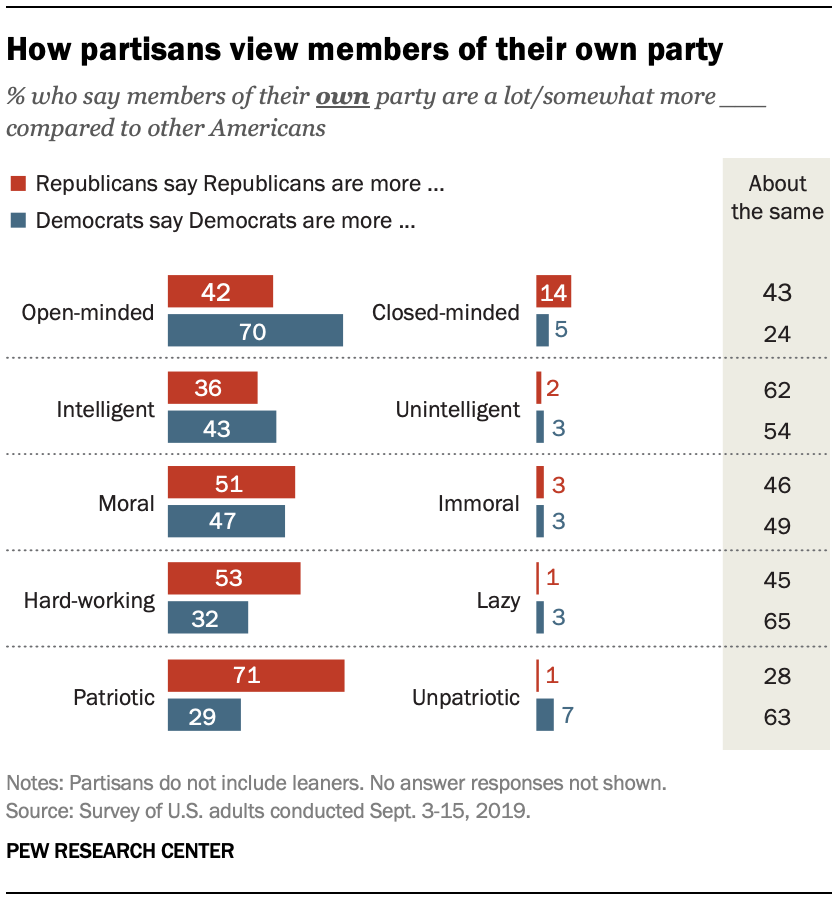 A
clear majority (70%) of Democrats say that Democrats are more
open-minded compared with other Americans. Republicans are considerably
less likely to ascribe this trait to members of their party: 42% say
members of the GOP are more open-minded than other Americans, while
about as many (43%) say they are on par with other Americans (14% say
they are more closed-minded).
A
clear majority (70%) of Democrats say that Democrats are more
open-minded compared with other Americans. Republicans are considerably
less likely to ascribe this trait to members of their party: 42% say
members of the GOP are more open-minded than other Americans, while
about as many (43%) say they are on par with other Americans (14% say
they are more closed-minded). However, Republicans are much more likely than Democrats to describe members of their own party as more patriotic (71% say this). By comparison, just 29% of Democrats say Democrats are more patriotic than other Americans (the majority – 63% – say they are about the same as other Americans).
While majorities of those in both parties say their co-partisans are about as intelligent as other Americans, Democrats are slightly more likely to view members of their party as more intelligent (43%) than Republicans are (36%).
Partisans say their differences with other party extend beyond politics
Majorities in both parties say that, aside from political differences, people in the other party do not share many of their other values and goals. About six-in-ten Republicans (61%) say, thinking about more than just politics, Democrats do not share many of their other values and goals; 54% of Democrats say the same about Republicans.
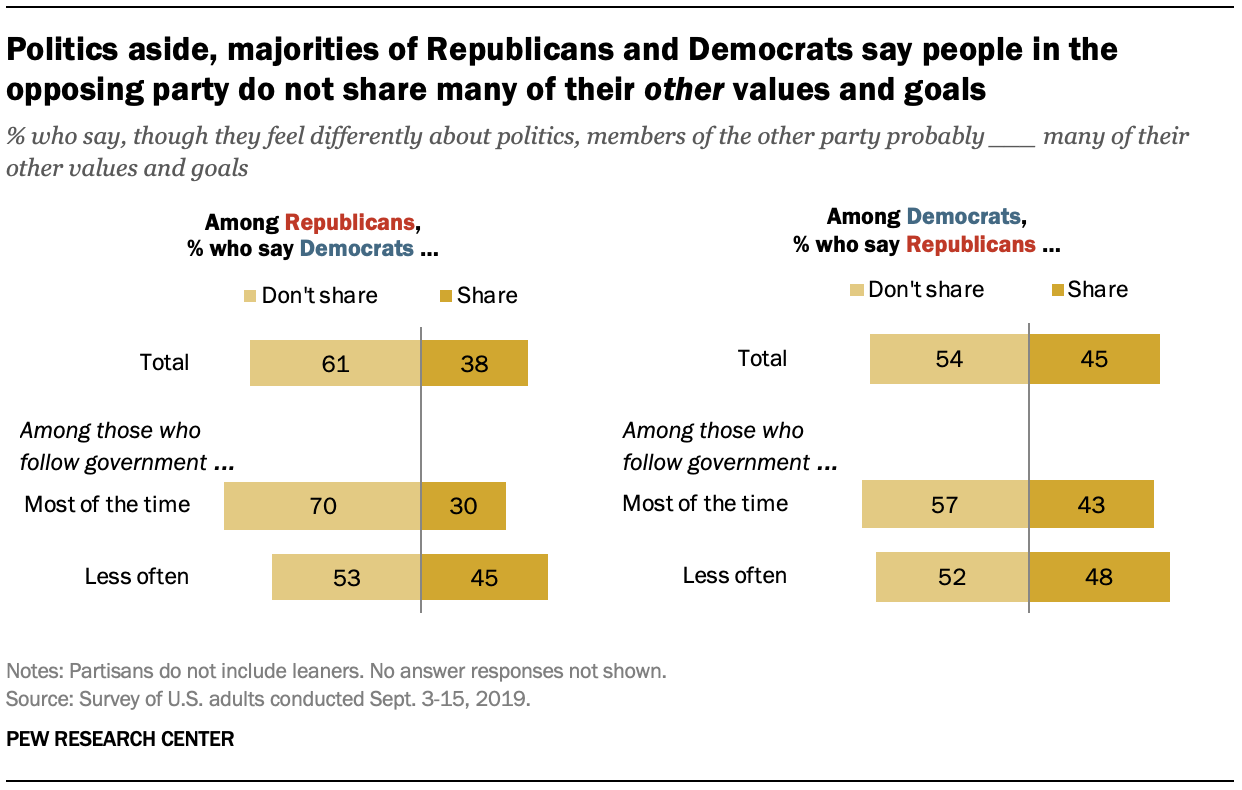
In the current survey, politically attentive Republicans are especially likely to say Democrats do not share their nonpolitical values and goals. Among Republicans who follow government and public affairs most of the time, 70% say that, setting political differences aside, Democrats do not share many of their other values and goals. That compares with 53% of Republicans who follow government less often.
Among Democrats, the differences based on attentiveness to government and politics are more modest: 57% of highly attentive Democrats say Republicans do not share many of their other values and goals, compared with 52% of less politically attentive Democrats.
Republicans, Democrats are increasingly positive about members of their own parties
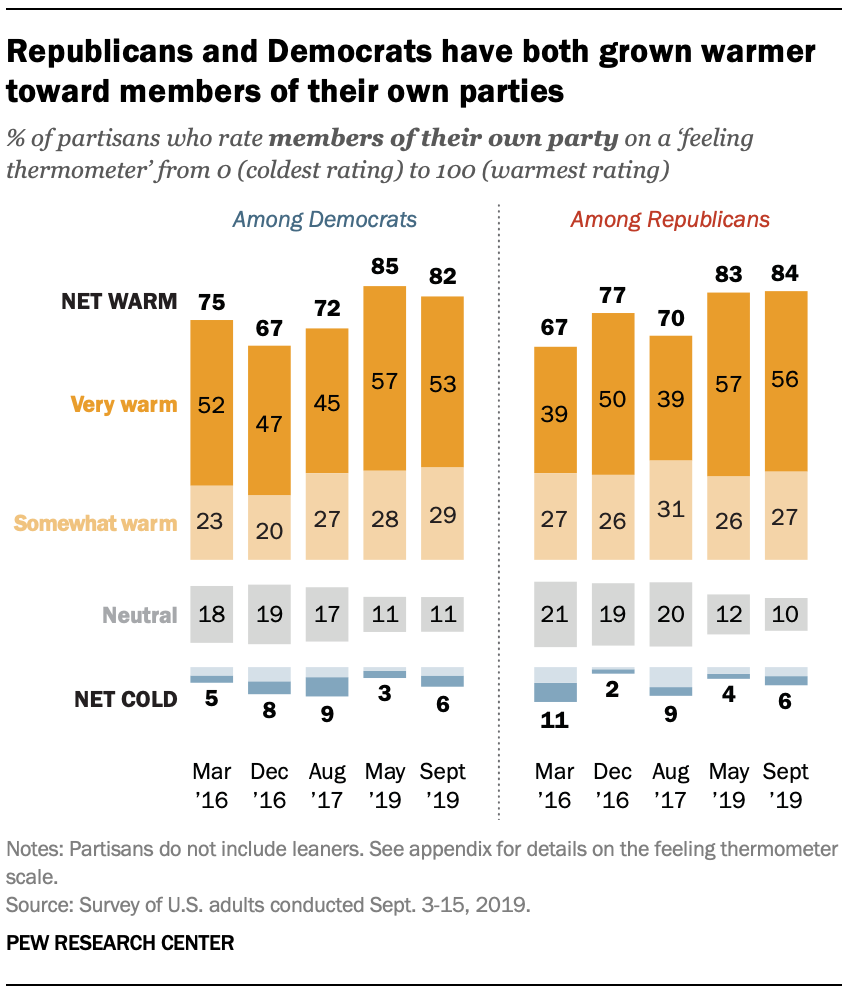 When
asked to rate Republicans and Democrats on a “feeling thermometer”
between 0 and 100 – where 0 is the most negative rating and 100 is the
most positive rating – large majorities of partisans rate the members of
their own party warmly. In both parties, the shares giving warm ratings
(a rating of 51-100) have increased since March 2016.
When
asked to rate Republicans and Democrats on a “feeling thermometer”
between 0 and 100 – where 0 is the most negative rating and 100 is the
most positive rating – large majorities of partisans rate the members of
their own party warmly. In both parties, the shares giving warm ratings
(a rating of 51-100) have increased since March 2016. About eight-in-ten Democrats (82%) and Republicans (84%) feel warmly toward their own party. In March 2016 – prior to the conclusion of the presidential primaries – 75% of Democrats and 67% of Republicans said that they had a warm view of their fellow partisans.
Since 2016, the shares of partisans with neutral feelings (a rating of 50 on the 0-100 thermometer) toward members of their own party have dropped from about one-in-five (19% of Democrats and 22% of Republicans) to about one-in-ten (11% of Democrats and 10% of Republicans).
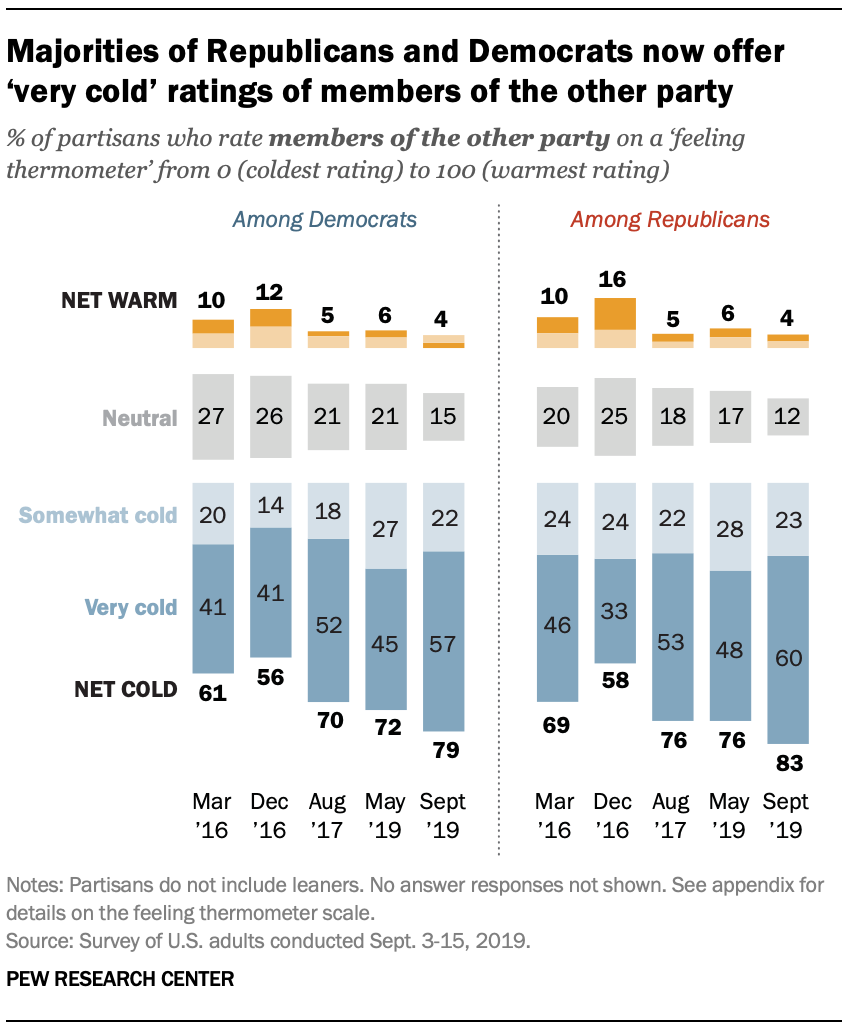 As
Republicans and Democrats take an increasingly positive view of members
of their own parties, they have become more negative toward members of
the opposing party.
As
Republicans and Democrats take an increasingly positive view of members
of their own parties, they have become more negative toward members of
the opposing party. Today, 79% of Democrats and 83% of Republicans rate the other party coldly (a thermometer rating of 0-49).
Three years ago, narrower majorities in both parties gave the other party a cold rating. In March 2016, 61% of Democrats gave Republicans a cold rating and 69% of Republicans gave Democrats a cold rating.
Since 2016, there has been an especially sharp rise in “very cold” feelings toward the opposing party. In March 2016, 41% of Democrats and 46% of Republicans gave the other party a very cold rating (less than 25 on the 0-100 scale). Today, 57% of Democrats and 60% of Republicans give the other party a very cold rating. And about three-in-ten Democrats (30%) and Republicans (32%) give members of the opposing party a rating of zero – the lowest on the scale.
‘Leaners’ are much less warm to their own party than are partisans
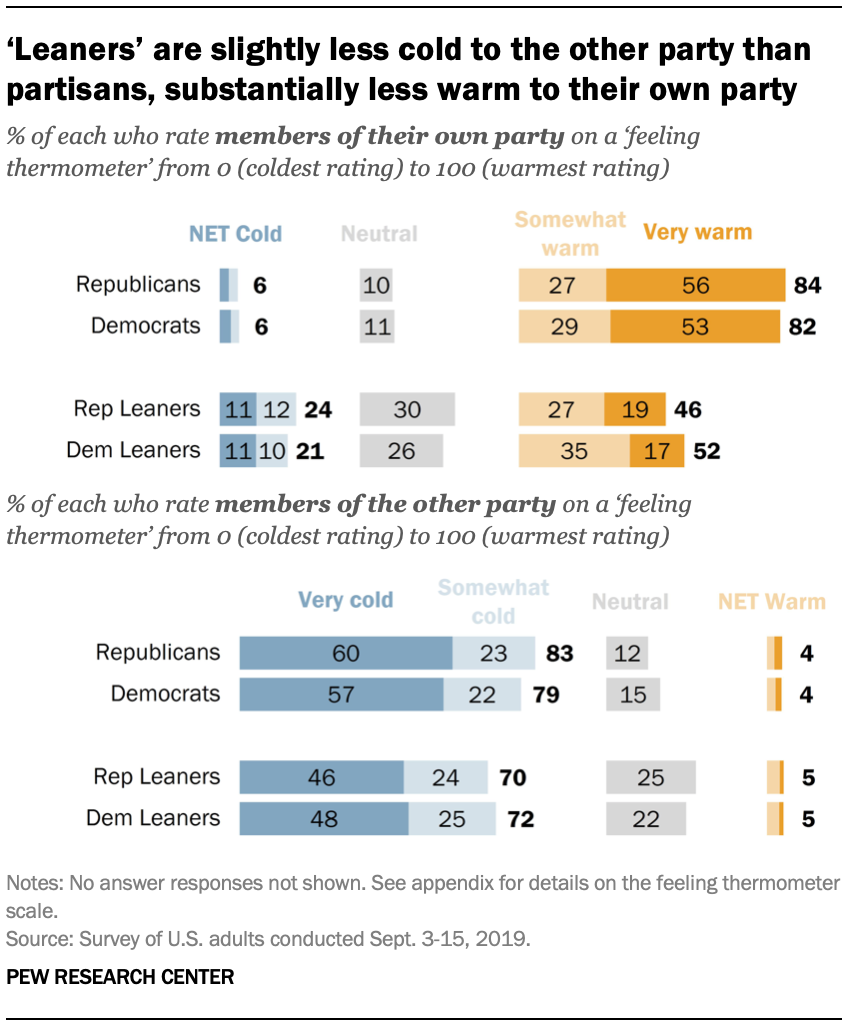 Compared
with those who identify with one of the political parties, those who
“lean” toward a party are considerably less likely to view members of
their own party warmly. However, they are only modestly less likely to
give a cold rating to the opposing party.
Compared
with those who identify with one of the political parties, those who
“lean” toward a party are considerably less likely to view members of
their own party warmly. However, they are only modestly less likely to
give a cold rating to the opposing party. While about eight-in-ten of those who identify with a party (84% of Republicans and 82% of Democrats) say they have warm feelings toward the members of their own party, only about half of partisan leaners say the same.
Among Republicans leaners, 46% rate Republicans warmly, while about as many Democratic leaners (52%) rate Democrats warmly.
However, majorities of partisan leaners – and those who identify with a party – have negative opinions of members of the opposing party. About eight-in-ten partisan identifiers (83% of Republicans and 79% of Democrats) have a cold view of the other party compared with about seven-in-ten leaners (70% of Republican leaners and 72% of Democratic leaners).
Growing shares of partisans give opposing ratings to the two parties
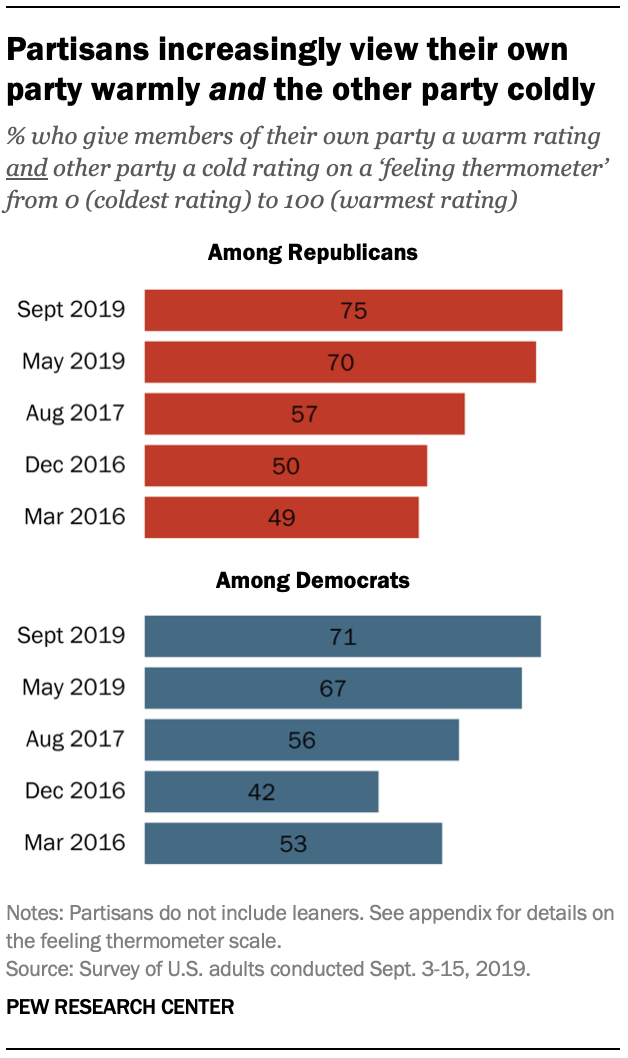 Three-quarters
of Republicans (75%) and 71% of Democrats now rate the members of their
own party warmly and the other party coldly. In both parties, the
shares holding this combination of views have steadily increased over
the past three years.
Three-quarters
of Republicans (75%) and 71% of Democrats now rate the members of their
own party warmly and the other party coldly. In both parties, the
shares holding this combination of views have steadily increased over
the past three years. The share of Republicans with this combination of views is 26 percentage points higher than it was just three years ago (75% now, 49% then). Among Democrats, there has been a similar increase in the share with a warm view of Democrats and a cold view of Republicans over this period (71% now, 53% then).
Men, older partisans most likely to view the other party ‘very coldly’
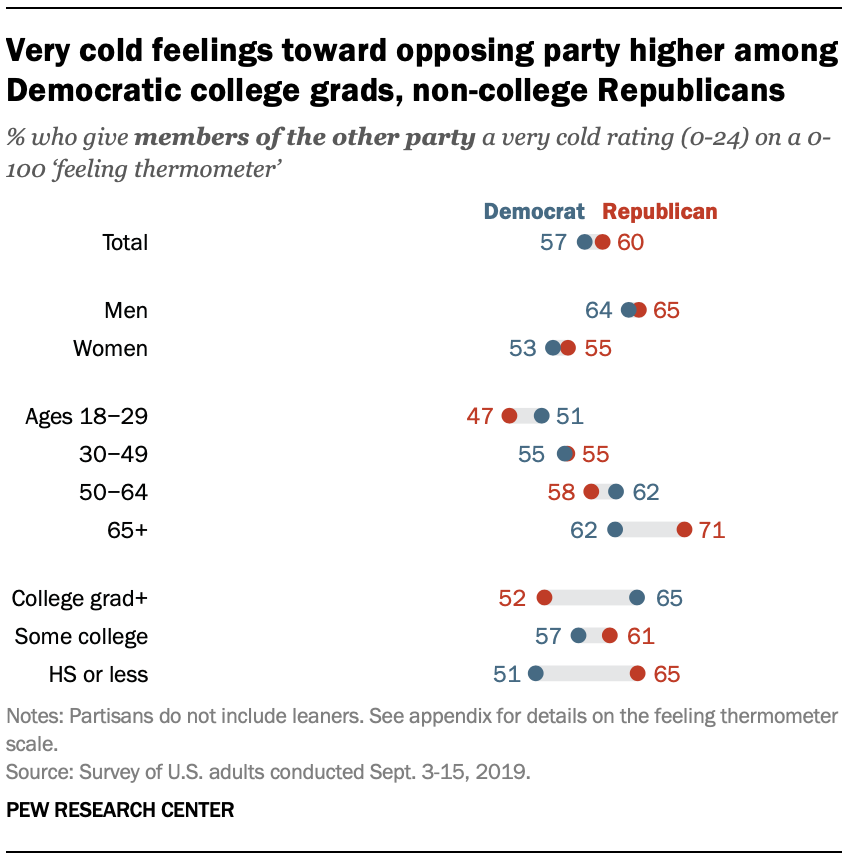 In
both parties, there are gender, age and educational differences in
“very cold” (0-24) ratings of members of the opposing party.
In
both parties, there are gender, age and educational differences in
“very cold” (0-24) ratings of members of the opposing party. Men in both parties are more likely than women to give colder ratings to the members of the other party. About two-thirds of Republican (65%) and Democratic (64%) men give the other party a very cold rating.
By comparison, 55% of Republican women and 53% of Democratic women offer a very cold rating to the members of the other party.
Similarly, in both parties, younger adults are less likely than older people to give highly negative ratings to the members of the opposing party.
Yet the education differences in these attitudes differ among Republicans and Democrats. Nearly two-thirds of Democrats with at least a four-year college degree (65%) give Republicans a very cold rating. That compares with 51% of Democrats who have not attended college. The pattern is reversed among Republicans: 52% of Republicans with a college degree give Democrats a very cold rating, compared with 65% of those with no college experience.
Politically attentive have stronger feelings toward both parties
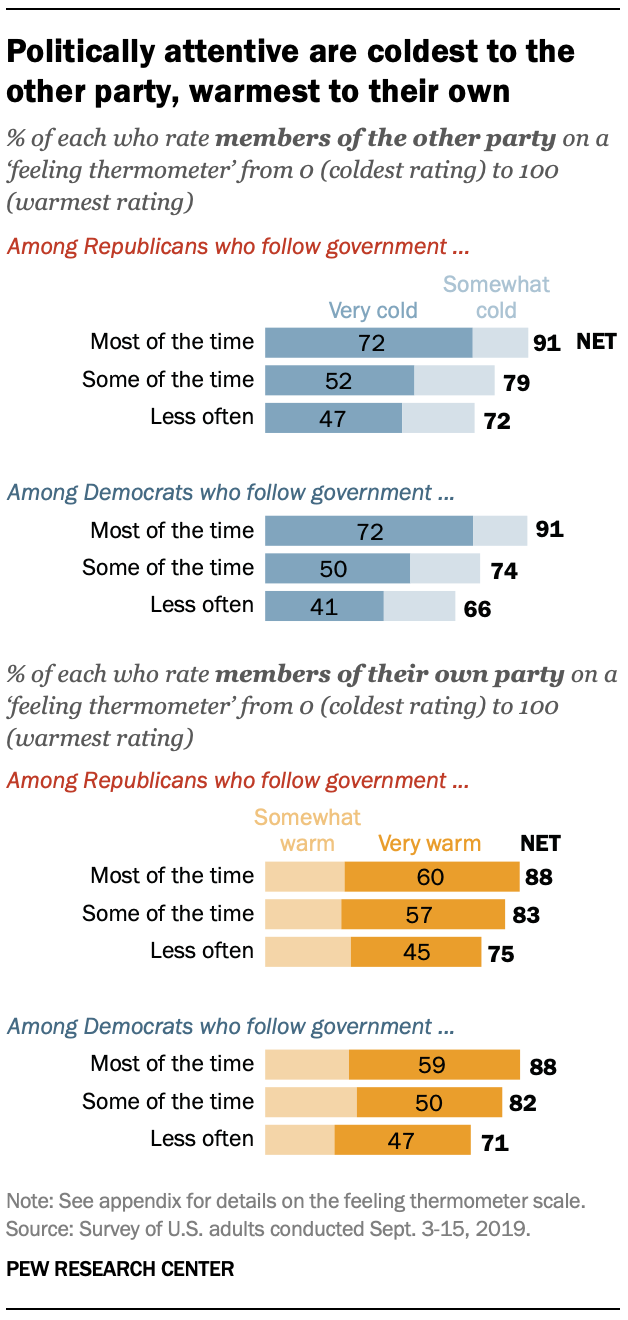 Partisans
who follow government and politics most closely are more likely than
less attentive partisans to give a cold rating to the other party – and a
warm rating to their own.
Partisans
who follow government and politics most closely are more likely than
less attentive partisans to give a cold rating to the other party – and a
warm rating to their own. About nine-in-ten (91% of both Republicans and Democrats) who say they follow government and public affairs most of the time give members of the other party a cold rating. By comparison, smaller majorities of those who follow government some of the time or less often give the opposing partisans cold ratings
The most politically attentive are also most likely to have warm views of their own party. Overwhelming majorities of partisans who say they follow government most of the time give members of their own party a warm rating (88% of both Republicans and Democrats). Narrower majorities of those who are less attentive to politics say the same.

אין תגובות:
הוסף רשומת תגובה